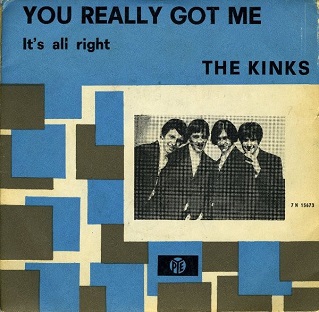
"You Really Got Me" is a song by English rock band the Kinks, written by frontman Ray Davies. The song, originally performed in a more blues-orientated style, was inspired by artists such as Lead Belly and Big Bill Broonzy. Two versions were recorded, with the second performance used for the final single. Lead guitarist Dave Davies performs the song’s famous guitar solo. Although it was long rumoured that future Led Zeppelin guitarist Jimmy Page had performed the song's guitar solo, this has been debunked by Page himself.
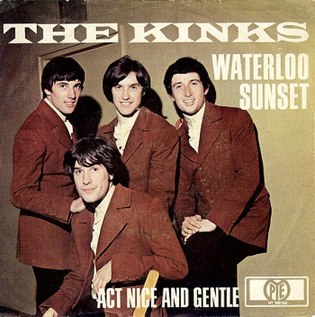
"Waterloo Sunset" is a song by English rock band the Kinks. It was released as a single on 5 May 1967 and featured on the album Something Else by the Kinks later that year. Written and produced by Kinks frontman Ray Davies, "Waterloo Sunset" is one of the band's best-known and most acclaimed songs, and was ranked number 14 on the 2021 edition of Rolling Stone's 500 Greatest Songs of All Time list. It was also their first single that was available in true stereo.

"A Well Respected Man" is a song by the British band the Kinks, written by the group's lead singer and rhythm guitarist Ray Davies, and originally released in the United Kingdom on the EP Kwyet Kinks in September 1965. It was also released as a single in the US and Continental Europe.

"Lola" is a song by the English rock band the Kinks, written by frontman Ray Davies for their 1970 album Lola Versus Powerman and the Moneygoround, Part One. The song details a romantic encounter between a young man and a possible cross-dresser or trans woman, whom he meets in a club in Soho, London. In the song, the narrator describes his confusion towards Lola, who "walked like a woman but talked like a man", yet he remains infatuated with her.
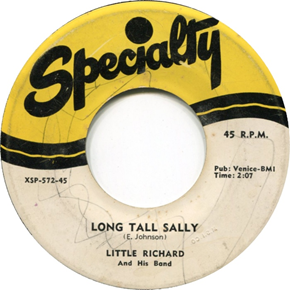
"Long Tall Sally", also known as "Long Tall Sally (The Thing)", is a rock and roll song written by Robert "Bumps" Blackwell, Enotris Johnson, and Little Richard. Richard recorded it for Specialty Records, which released it as a single in March 1956, backed with "Slippin' and Slidin'".

"Apeman" is a 1970 song by the English rock band the Kinks. It was written by Ray Davies and appears on the album Lola Versus Powerman and the Moneygoround, Part One. Written as a call to return to nature amidst the crowding and industry of the city, the song features calypso stylings. Like its predecessor, "Lola", it had to have a lyric re-dubbed for commercial release.

"All Day and All of the Night" is a song by the English rock band the Kinks from 1964. Released as a single, it reached No. 2 in the UK on the Record Retailer chart and No. 7 on the US Billboard Hot 100 chart in 1965. The song was included on the Kinksize Hits EP in the UK and the Kinks' second American album, Kinks-Size (1965).

"Sunny Afternoon" is a song by the Kinks, written by frontman Ray Davies. The track later featured on the Face to Face album as well as being the title track for their 1967 compilation album. Like its contemporary "Taxman" by the Beatles, the song references the high levels of progressive tax taken by the British Labour government of Harold Wilson, although it does so through the lens of an unsympathetic aristocrat bemoaning the loss of his vast unearned wealth. Its strong music hall flavour and lyrical focus was part of a stylistic departure for the band, which had risen to fame in 1964–65 with a series of hard-driving, power-chord rock hits.
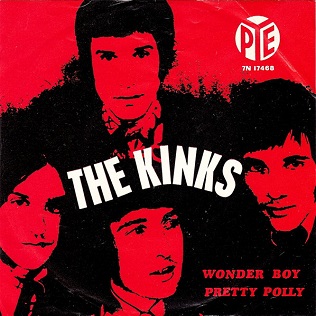
"Wonderboy" is a song by the English rock band the Kinks, released as a single in 1968. It stalled at number 36 in the UK charts, becoming the band's first single not to make the UK Top Twenty since their early covers.

"Tired of Waiting for You" is a song by the English rock band the Kinks. It was released as a single on 15 January 1965 in the UK and on 17 February 1965 in the US. The single reached number one in the UK and number six in the US. It then appeared on their second studio album, Kinda Kinks. It was the group's highest-charting single in the US - tied with "Come Dancing", which achieved the same chart position eighteen years later in 1983.
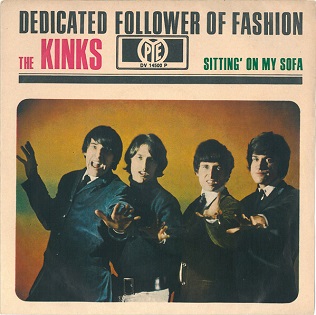
"Dedicated Follower of Fashion" is a 1966 song by British band the Kinks. It lampoons the contemporary British fashion scene and mod culture in general. Originally released as a single, it has been included on many of the band's later albums.
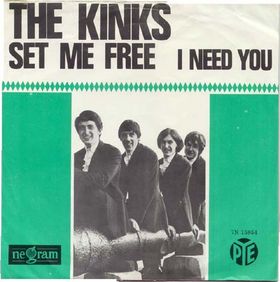
"Set Me Free" is a song by Ray Davies, released first by the Kinks in 1965. Along with "Tired of Waiting for You", it is one of band's first attempts at a softer, more introspective sound. The song's B-side, "I Need You", makes prominent use of powerchords in the style of the Kinks' early, "raunchy" sound. "Set Me Free" was heard in the Ken Loach-directed Up the Junction, a BBC Wednesday Play which aired in November 1965; this marked the first appearance of a Kinks song on a film or TV soundtrack.

"Till the End of the Day" is a song by the Kinks, written by Ray Davies and released as a single in 1965 and later on their album The Kink Kontroversy. It centres on a power chord, like many of the group's early hits, and was similarly successful, reaching number eight in the United Kingdom and number 50 in the United States, spending eight weeks or more in each chart.

"Dead End Street" is a song by the British band the Kinks from 1966, written by main songwriter Ray Davies. Like many other songs written by Davies, it is to some degree influenced by British Music Hall. The bass playing was partly inspired by the "twangy" sound of Duane Eddy's guitar. It was originally released as a non-album single, but has since been included as one of several bonus tracks from the Face to Face CD. The song, like many others by the group, deals with the poverty and misery found in the lower classes of English society.
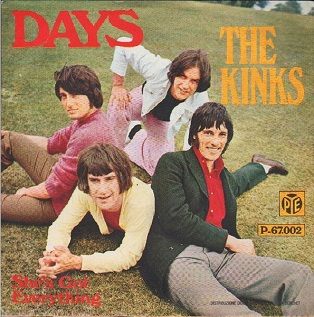
"Days" is a song by the Kinks, written by lead singer Ray Davies, released as a single in 1968. It also appeared on an early version of the album The Kinks Are the Village Green Preservation Society. It now appears as a bonus track of the remastered CD. On the original Pye 7N 17573 label, the name of the song is "Day's" owing to a grammatical error.

"Let's Dance" is a 1962 hit single by Chris Montez, written and produced by Jim Lee.

"Ev'rybody's Gonna Be Happy" is a song by Ray Davies, released as a UK single by the Kinks in 1965. As the follow-up to the number-one hit "Tired of Waiting for You", and having their previous three singles all chart among the top two, it was less successful, reaching number 17. It broke a run of what would have been thirteen consecutive top-ten singles in the UK.
"So Mystifying" is a song written by English musician Ray Davies, first recorded by his band the Kinks for their 1964 debut album Kinks. It appears as the second track on side one, following "Beautiful Delilah", and is the first track on the album on which Ray Davies performs the lead vocals. The best known version of the song was recorded by Swedish rock group Hep Stars, whose version of the song reached the top-five on both Kvällstoppen and Tio I Topp in 1965.
"Crazy 'Bout My Baby" is a song first written and recorded by musician Robert Mosley in 1963. His third solo single, it failed to chart, leading to it becoming his final single released. Initially an obscure single, it was brought to light by mainstream acts such as The Swinging Blue Jeans and Tages, the latter of which charted in Sweden with it.

"The One for You" is a song written by Swedish guitarist Danne Larsson and recorded by his group Tages in 1965. Following an intensive tour of the Sweden, while also previously having composed songs for the band, Larsson wrote the song inspired by their trip to London, allegedly about a girl he had met there. It was the first recording by Tages produced by Anders Henriksson, who would come to produce the majority of their coming output, along with being their first single recorded at Europafilm Studios in Bromma, Stockholm.


















